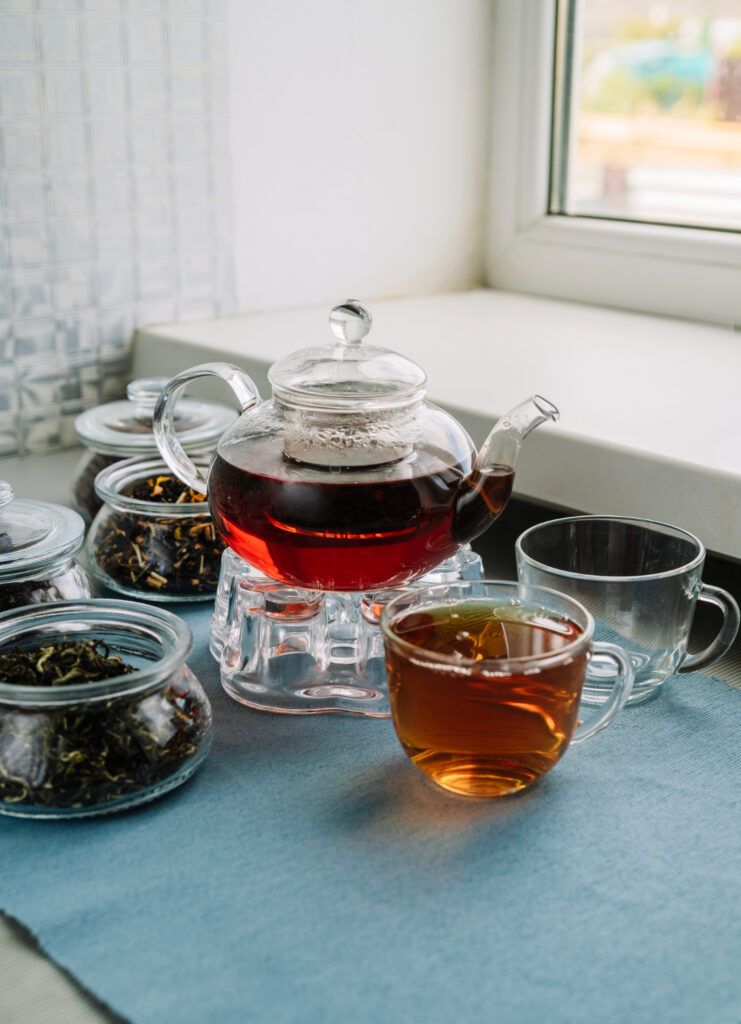
In this article
Rooibos tea is an herbal beverage made from the fermented leaves of the Aspalathus linearis plant, which is native to South Africa. Known for its sweet, earthy flavor, rooibos tea has been enjoyed since the 1700s. Recently, many health benefits of rooibos tea have been discovered, making it a popular caffeine-free alternative to green and black teas. It is rich in antioxidants and supports various aspects of health, including protection against oxidative stress, heart health, and blood glucose management.
Rich in Antioxidants
Rooibos tea is rich in antioxidants, which help fight oxidative stress and neutralize free radicals in the body. These antioxidants include polyphenols and flavonoids, which have anti-inflammatory properties that support cellular health. One of the key antioxidants in rooibos tea is aspalathin, especially abundant in green rooibos tea, which contains ten times more aspalathin than red rooibos tea. Aspalathin is linked to improved cell viability and skin health, potentially helping to prevent cancer by targeting premalignant skin cells.
Low in Tannins
Unlike many other teas, rooibos tea is very low in tannins. Tannins are water-soluble compounds found in various plants, including tea leaves, and they can interfere with nutrient absorption by forming complexes with proteins and minerals. Because rooibos tea is low in tannins, it is suitable for those at risk of mineral deficiencies, such as individuals following vegan or vegetarian diets. Its low tannin content also means rooibos tea has a smooth, mild flavor without the bitterness often associated with other teas.
Caffeine-Free
Rooibos tea is naturally caffeine-free, making it an excellent option for those sensitive to caffeine. Caffeine, while beneficial for some, can disrupt sleep patterns, increase anxiety, and trigger migraines. Without caffeine, rooibos tea can be consumed at any time of day, including in the evening, promoting relaxation and stress reduction. Additionally, rooibos tea does not have the diuretic effects of caffeine, making it better for hydration.
May Support Blood Sugar Management
Rooibos tea may help manage blood sugar levels by improving insulin sensitivity and reducing inflammation caused by oxidative stress. The antioxidant aspalathin in rooibos influences fatty acid synthesis and glucose metabolism, helping to regulate blood glucose concentrations. However, significant daily consumption (500-1,200 mL) is required to achieve these benefits. Rooibos tea should complement, not replace, medical treatments for diabetes.
May Support Heart Health
Rooibos tea may benefit heart health due to its antioxidant properties. Studies have shown that daily consumption of rooibos tea can improve blood lipid profiles, reducing LDL cholesterol and increasing HDL cholesterol. While more research is needed, rooibos tea’s antioxidant, anti-inflammatory, and anti-diabetic effects suggest it can help prevent cardiovascular disease by supporting the immune system, adrenal pathways, and lipid metabolism.
Nutritional Facts of Rooibos Tea
Plain rooibos tea is calorie-free and contains no fat, carbohydrates, protein, sodium, fiber, or added sugars, making it ideal for hydration without affecting weight management or blood pressure. However, adding ingredients like milk, cream, sugar, or honey will change its nutritional profile. Therefore, it is important to consume rooibos tea in moderation and be mindful of any additives.
Rooibos Tea as a Supplement
Rooibos is also available as an herbal supplement in capsule, powder, and tincture forms, often used for potential liver health benefits. Rooibos supplements should be used cautiously and under medical guidance, as research on effective dosages is limited.
Risks of Rooibos Tea
Rooibos tea is generally safe for healthy adults, but excessive consumption may lead to reduced intake of other nutrient-rich beverages. There are anecdotal reports of liver irritation and potential interactions with certain medications, such as hypoglycemic and dyslipidemic drugs. Consulting a healthcare provider is advisable, especially for those on medication. Limited research exists on rooibos tea’s safety during pregnancy and breastfeeding, so moderate consumption is recommended unless otherwise directed by a doctor.
Tips for Consuming Rooibos Tea
- Brew rooibos tea by steeping the leaves in boiled water for 5-7 minutes.
- Enhance the flavor with lemon slices, cinnamon sticks, or fresh mint leaves.
- Make iced rooibos tea by brewing double-strength tea and cooling it before serving over ice.
- Blend rooibos with other herbal teas to maximize health benefits.
- Store rooibos tea in an airtight container in the fridge to preserve its flavor and freshness.
Incorporating rooibos tea into your diet can offer numerous health benefits, making it a valuable addition to a well-balanced lifestyle
A Quick Review
Rooibos tea, a caffeine-free herbal tea from South Africa, is known for its sweet, earthy flavor and impressive health benefits. Rich in antioxidants like aspalathin, it helps reduce oxidative stress, supports heart health, and aids in blood sugar management. Unlike many other teas, rooibos is low in tannins, ensuring better nutrient absorption and a smooth taste. Ideal for any time of day, rooibos tea is a versatile and healthful addition to your diet.











